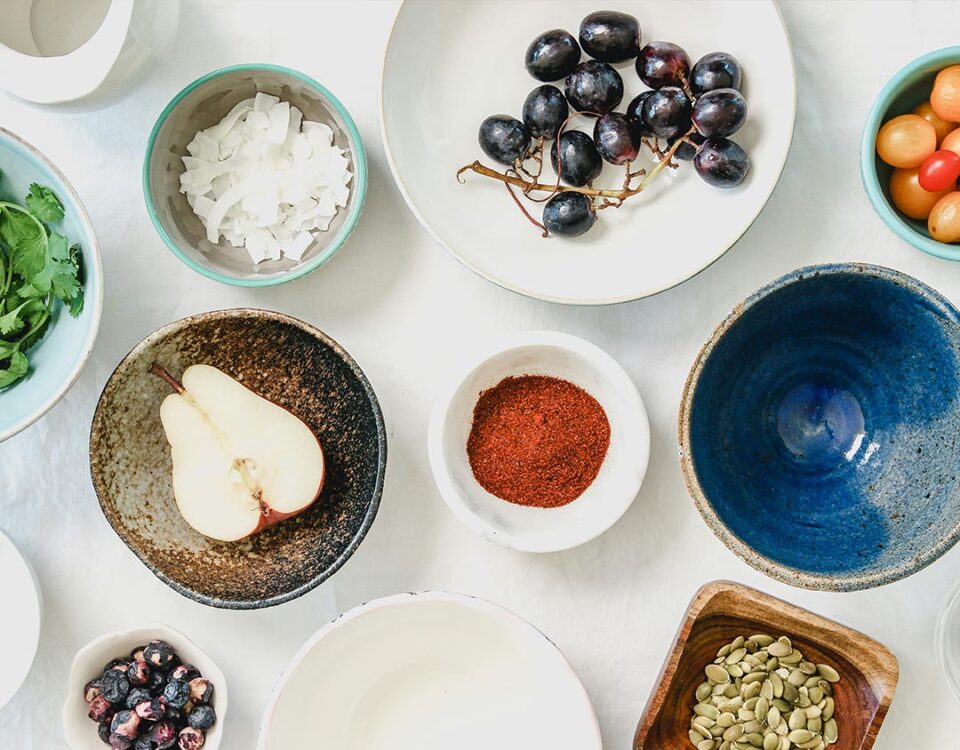
The Importance of Meal Timing
August 30, 2022
How to Read a Nutrition Label
October 6, 2023We have many microorganisms that live in our gut. These include bacteria, viruses, and fungi. You might think of bacteria as harmful and dangerous, and while some bacteria are bad for you, there are also good bacteria that are beneficial to the body and help improve your overall health.

S o, how can we increase the amount of good bacteria that we have and promote their activity?
This is where PREbiotics come in. A prebiotic is a non-digestible food component that acts as fuel for the beneficial bacteria in your large intestine1,2. Prebiotics are specific dietary fibers, ones that the human body cannot break down or absorb, therefore it stays in your digestive tract and eventually reaches the large intestine. There are many types of prebiotics, such as fructooligosaccharides (FOS) like inulin found in garlic, onions, and whole grain wheat, and galactooligosaccharides (GOS) found in beans and chickpeas4. Prebiotic supplements are also available to help you get the fibre necessary to maintain a healthy gut flora.
Food Sources of Prebiotics
- Garlic
- Onions and leeks
- Whole grain wheat (e.g. pasta, bread)
- Asparagus
- Jerusalem artichokes
- Green peas and snow peas
- Beans
- Lentils
- Chickpeas
- Oats
- Flaxseed
- Mushrooms
- Bananas
- Apples
- Seaweed
Prebiotics play a more important role in your overall digestive health than probiotics. When bacteria feed on the prebiotics from food, they produce helpful byproducts through a process called fermentation. Some of these byproducts include short-chain fatty acids that keep our large intestine healthy by fueling the cells that line our digestive tract, encouraging regular bowel movements, fighting against bad bacteria, reducing inflammation, and reducing the risk of colon cancer3.
It’s important to note that eating a lot of prebiotic-rich foods, especially all at once, can increase gas production in the gut (more fermentation!). If you have a more sensitive gut, like in the case of IBS, this may result in bloating and abdominal pain. In that case, try introducing these foods in smaller quantities and gradually to see how well you tolerate them. Working with a dietitian who specializes in gut health can provide more guidance.
When we don’t get enough prebiotics in our regular diet, the good bacteria then have to find food from other sources and may break down our protective mucous layer of the gut and/or use undigested proteins from our diet as fuel, which may increase inflammation.


Now let’s dive into probiotics, which are talked about more often. Probiotics are different from prebiotics because instead of feeding the beneficial bacteria, these are the beneficial bacteria themselves! There are many factors that determine what types of bacteria and how many we have in our gut, such as our family genetics, how we were born (i.e. vaginally or cesarean), if we were breastfed or formula-fed, medications we’ve taken, how varied our diet has been, how many prebiotics and different fibres we eat, and much more.
Probiotics can be found in fermented foods such as yogurt, kefir, kombucha, sauerkraut, miso, and pickles7. There are also many different types of probiotic supplements on the market. It’s important to note that there is still a lot we don’t know on how specific strains of bacteria influence our digestive and overall health, but the research in this area is growing daily. Certain strains of probiotics have been shown to be beneficial for certain conditions. The two more commonly known groups that have been studied for their health benefits include: Lactobacillus and Bifidobacterium5. For example, Bifidobacterium longum 35624 has been shown to reduce symptoms of IBS. Other helpful strains can be found in the probioticchart.ca, and as mentioned above, be sure to consult your healthcare provider to determine if a probiotic supplement is right for you. If you are starting a probiotic supplement, try it for 3 months and if there does not seem to be any improvements in digestive health or symptoms, then there is no need to continue taking it. Generally, it is recommended that a product has a minimum of 10 billion CFUs6.
When you have a bacterial infection, antibiotics are used to kill the harmful bacteria in your gut. However, antibiotics are not selective in the bacteria that they kill, meaning that they can decrease the beneficial bacteria in your gut as well. Probiotics may help restore the microbiome after such a disturbance5. They have also been found to decrease the possibility of developing antibiotic-associated diarrhea by over 50%6. It is always best to consult your doctor prior to taking action.
Focus on Food: The best way to optimize gut health is to have a varied and balanced diet, rich in fibre, including prebiotic fibres. Incorporating fermented foods into your diet can also help promote the healthy amount of good bacteria in your gut. At this point in time, the research does not support the need to take a generic probiotic supplement for optimal gut health8.
The best way to optimize gut health is to have a varied and balanced diet, rich in fibre, including prebiotic fibres.
Written by Samira Razmjou and Liz Powell, RD
References:
- Manning, T. S., & Gibson, G. R. (2004). Microbial-gut interactions in health and disease. Prebiotics. Best Practice & Research. Clinical Gastroenterology, 18(2), 287–298.
- Franck, A., & Levecke, B. (2003). Inulin. In Ullmann’s Encyclopedia of Industrial Chemistry. Wiley-VCH Verlag GmbH & Co. KGaA. https://doi.org/10.1002/14356007.g14_g02
- What Are Prebiotics? | GutDr Mini-Explainer. (2021, June 13). https://www.youtube.com/watch?v=8JfObRhoWXQ
- The Children’s Hospital of Philadelphia. (2022, December 21). Food as Medicine: Prebiotic Foods. https://www.chop.edu/health-resources/food-medicine-prebiotic-foods
- Probiotics: What You Need To Know. (n.d.). NCCIH. Retrieved July 27, 2023, from https://www.nccih.nih.gov/health/probiotics-what-you-need-to-know
- Sanders, M. E. (2008). Clinical use of probiotics: what physicians need to know [Review of Clinical use of probiotics: what physicians need to know]. American Family Physician, 78(9), 1026.
- How to get more probiotics. (2023, July 26). Harvard Health. https://www.health.harvard.edu/staying-healthy/how-to-get-more-probiotics
- Should you take probiotics? (2022, February 2). Harvard Health. https://www.health.harvard.edu/staying-healthy/should-you-take-probiotics
- Taylor, M., & Zitz, S. (2020, August 24). The 10 Best Probiotic Supplements of 2023, According to Experts. Prevention. https://www.prevention.com/food-nutrition/g33704757/best-probiotic-supplements/





